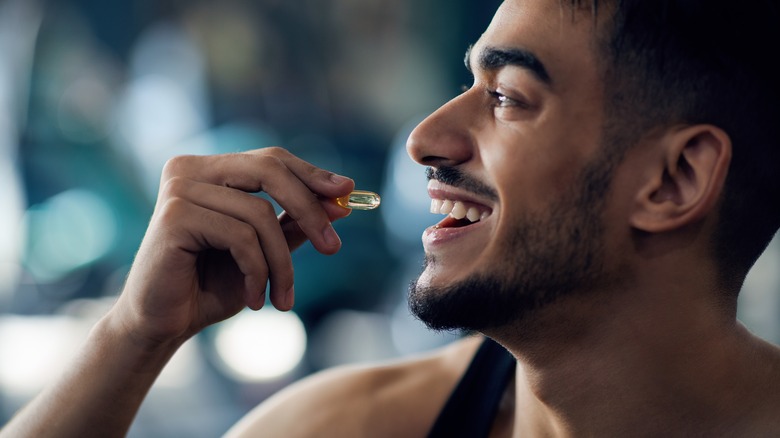How To Naturally Increase Testosterone Levels
Testosterone performs a number of roles in men and women. However, it is the primary sex hormone in males (via Harvard Health Publishing). It affects muscle size and strength, sexual desire, producing sperm, and bone strength. During puberty, this involves rapid growth of the penis and testicles, and voice deepening.
The level of testosterone has real effects on your body. Too little of the hormone can cause a lack of sex drive, less bone and muscle mass, hair loss, and an increase in body fat, according to Medical News Today. On the other hand, too much testosterone can also negatively affect the body. However, it's a more rare condition than low testosterone production (via Everyday Health). The symptoms include changes in the size of the testicles, fluid retention, insomnia, and acne or oily skin.
If you think you may have low testosterone, your primary care physician may be able to help with a set of blood tests, according to Urology Health. Roughly 2.1% of men may have low testosterone, also defined as 300 nanograms per deciliter. If you think you may be one of them, there are natural ways to increase your testosterone levels.
People who exercise and lift weights have higher testosterone levels
Exercise has many proven health benefits. Higher testosterone levels is one of them. A 2012 study found that men who exercised regularly had higher levels of testosterone compared to men who were inactive. Women also benefited from incorporating a daily workout (via Piedmont). Although, unlike men, as a result of working out, estrogen hormones increase, which helps with unpleasant menopause symptoms.
While any type of exercise does the trick, resistance training, like weight lifting, has been found to be the most successful at increasing levels of testosterone in men (via Piedmont). "As muscle mass increases, it will trigger the body to produce more testosterone," says urologist, Dr. Jadick, D.O.
Physical activity may also help you lose weight, which can help with low testosterone (via Piedmont). Men who have too much visceral fat regularly have low levels of the hormone compared to those with healthy levels of body fat.
Taking vitamin D may help boost testosterone levels
Every day people around the world take vitamin D supplements. It has become a popular supplement for those with vitamin D deficiency. In fact, close to one in every five adults, in the United States alone, are taking the vitamin (via Reuters). However, some seem to be going overboard with their intake, which can later lead to kidney stones, fractures, and even cancers.
Nevertheless, when taken properly, vitamin D has been shown to boost testosterone levels. A 2011 study, done over the course of one year, found that men taking the vitamin "might" improve the levels of the hormone. However, if you prefer to go even more natural, try to spend some time outside in the sun on a regular basis, that is if your location allows for it, explains Healthline.
In order to check if you suffer from a lack of vitamin D, ask your primary physician to run a blood test to examine your levels, as per Cleveland Clinic.
Increased stress can quickly reduce testosterone
When your stress increases so does your level of cortisol, according to WebMD. It is your body's main stress hormone and is used to regulate mood, fear, and motivation levels. Think of cortisol as your body's alarm going off when potential danger is nearby. When the body undergoes too much stress, too much cortisol is released which leads to different health problems, including reduced testosterone, explains Healthline. By lowering your stress, you can decrease your level of cortisol and thus increase your levels of testosterone.
Aside from your affecting your cortisol, high stress can make you gain weight, which might lead to a further decline in testosterone, according to a 2007 study. While it can be difficult to decrease your stress depending on your lifestyle, try getting regular exercise, getting more sleep, and eating a balanced diet, explains Cleveland Clinic. These can lead to a balanced life that will lower your stress levels.
Plenty of restful sleep will help prevent reduction of testosterone levels
Getting adequate sleep leads to many health benefits, according to the U.S. Department of Health and Human Services. By getting seven or more hours of sleep every night, you will reduce your chances of getting sick, maintain a healthy weight, decrease your stress, and just be in a better mood, among other things.
The amount of sleep you get has big implications on your testosterone levels, explains Healthline. A 2007 study measured the amount of sleep that twelve men got, all ranging between the ages of 64 to 74 years. The study concluded that depending on the number of hours they slept is what indicated the levels of testosterone they had in the morning.
In a 2010 study, aside from age, the length of sleep was linked to androgen levels in Asian-Chinese men. The research concluded that the result of observing sleep hygiene could be helpful for those with low androgen hormones. So while some people may need less sleep than others, you could try sleeping more if you feel like your testosterone levels are low.
Try natural testosterone boosters
Contrary to popular belief, there are natural testosterone supplements that are supported by scientific studies (via Healthline). These natural boosters have been shown by research to enhance testosterone in infertile men.
One herb that has been extensively studied is ashwagandha. It's a plant that grows in Asia and Africa and has chemicals that may help with minimizing blood pressure and swelling, according to WebMD. Further research has shown that ashwagandha is useful for alleviating stress, which can be a huge factor in testosterone production, according to a 2012 study.
If you can't get hold of ashwagandha, try picking up some ginger next time you go grocery shopping. A 2012 study was done on 75 infertile men, ranging between the ages of 19 to 40 years old that had been married for a minimum of two years. All in all, ginger showed a significant rise in testosterone, among other hormones.






